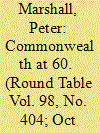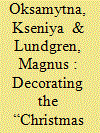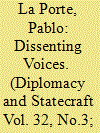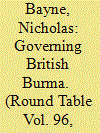|
|
|
Sort Order |
|
|
|
Items / Page
|
|
|
|
|
|
|
| Srl | Item |
| 1 |
ID:
090881


|
|
|
|
|
| Publication |
2009.
|
| Summary/Abstract |
The London Declaration of 26 April 1949, made by Commonwealth Prime Ministers, was an act of statesmanship of rare insight and imagination, as was its approval by King George VI. It paved the way for the emergence of a voluntary forward- and outward-looking association of sovereign, independent governments and peoples, alive to their common values and traditions, and conscious of the contribution they can together bring to making the world a better place. The Commonwealth is an international asset as well as a boon to its members.
|
|
|
|
|
|
|
|
|
|
|
|
|
|
|
|
| 2 |
ID:
184651


|
|
|
|
|
| Summary/Abstract |
Contemporary peacekeeping operations carry out many disparate tasks, which has triggered a debate about “Christmas Tree mandates.” Did the UN Secretariat or the UN Security Council drive this expansion? Using original data on nineteen UN peacekeeping missions, 1998–2014, this article compares peacekeeping tasks recommended by the Secretariat to those mandated by the Council. It finds that the two bodies expressed different preferences regarding the nature, number, and novelty of peacekeeping tasks. First, the Council dropped Secretariat-recommended tasks as often as it added new ones on its own initiative. Second, the two bodies disagreed more over peacebuilding and peacemaking tasks than over peacekeeping tasks. Third, the Council preferred to be the one to introduce novel tasks that had not appeared in previous mandates. Finally, among the countries that “held the pen” on peacekeeping resolutions, the United States was the most prone to dropping Secretariat-proposed tasks and the least willing to add tasks itself.
|
|
|
|
|
|
|
|
|
|
|
|
|
|
|
|
| 3 |
ID:
181019


|
|
|
|
|
| Summary/Abstract |
This analysis explores the criticism about the creation of mandates in the League of Nations, particularly in the Secretariat; there, a number of officials questioned the organisation’s stance on this matter. Their critical views showed the crucial importance of the early debates in shaping the League’s nature and revealed the existence of a core group of eminent Secretariat members whose beliefs objected to the principles underlying the draft mandate provisions and the League’s tacit assent in their approval. These opinions highlighted administrative shortcomings in the League’s structure, particularly the Secretariat’s role and the ambiguous attitude of the secretary general, and foresaw the detrimental consequences that the mandates system would have for the League’s reputation. Some Secretariat members, who envisaged a more assertive role for the institution, vigorously challenged views on the League’s helplessness in the international post-war context that have come to predominate in current scholarship.
|
|
|
|
|
|
|
|
|
|
|
|
|
|
|
|
| 4 |
ID:
077782


|
|
|
|
|
| Publication |
2007.
|
| Summary/Abstract |
My grandfather, Charles Bayne, spent his career in the Indian Civil Service administering Burma from 1880 to 1906. He and three colleagues - Edward Symes, Donald Smeaton and Herbert Thirkell White - filled the key posts in the central Burmese administration for two decades. He assisted Sir Charles Crosthwaite (Chief Commissioner 1887 - 90) in pacifying the province after the third Burmese war. Through the calmer 1890s he was responsible for economic policies, especially rice cultivation and teak forests. But the quartet broke up in the 1900s: Symes committed suicide; Smeaton fell out with Lord Curzon; Bayne, after two breakdowns, retired early; only White survived, to end his career as Lieutenant Governor. Burma's experience 100 years ago has parallels with the occupation of Iraq and the advance of globalization. The British annexed Upper Burma before deciding its future. The colonial administration was orderly, but inhibited the growth of locally based, democratic government, with consequences still seen today. Burma under British rule grew rich from the export of rice and teak (and later oil), but this wealth went mainly to expatriates, not local Burmese cultivators. The resentment this caused later brought a reversion to inward-looking economic policies
|
|
|
|
|
|
|
|
|
|
|
|
|
|
|
|
|
|
|
|
|